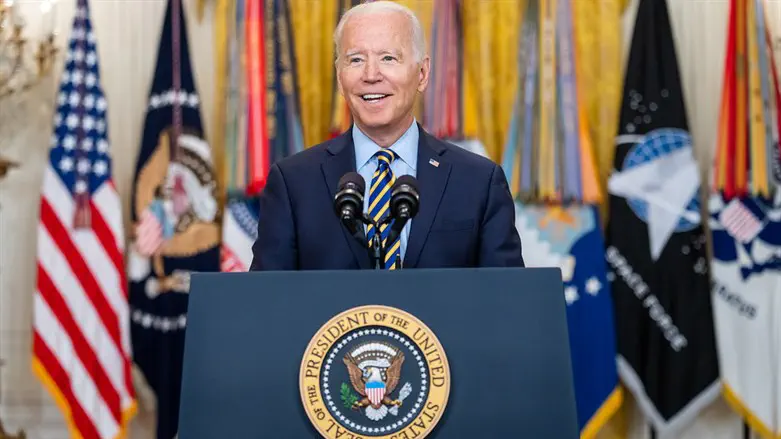
The United States is preparing "additional measures" against Iran as expectations grow that talks on halting Tehran's nuclear program are set for failure, White House Press Secretary Jen Psaki said, according to the AFP news agency.
"The president has asked his team to be prepared in the event that diplomacy fails and we must turn to other options," said Psaki.
"We will have no choice but to take additional measures," she added.
Her comments came after US Defense Secretary Lloyd Austin met Defense Minister Benny Gantz at the Pentagon on Thursday, and both sides said they would expand cooperation in the face of the Iranian threat.
During the meeting, Minister Gantz thanked Secretary Austin for the ongoing cooperation between the respective defense establishments, which is unparalleled on all levels. He also expressed gratitude for Secretary Austin’s personal commitment and contribution to strong US-Israel relations and to the security of the State of Israel.
The Ministers discussed emerging challenges and opportunities in the region, with a particular focus on the developing challenge vis-à-vis the Iranian nuclear program and its regional aggression.
Minister Gantz and Secretary Austin also touched on the importance of maintaining Israel’s Qualitative Military Edge (QME) in an increasingly unstable region, and the critical need for the replenishment of Israel’s air defense systems.
“Israel’s QME will not only guarantee the safety of our citizens, but will also enable us to leverage the positive trends in the region. Only a strong, secure Israel can extend its hand in peace to its neighbors. Only a strong and secure Israel can work with its new partners to expand normalization and create alliances against emerging threats,” said Gantz.
Regarding the Iranian threat, Minister Gantz said: “Iran is not just a threat to our physical security. Iran poses a concrete threat to our way of life and our shared values. In its aspirations to become a hegemon - Iran seeks to destroy all traces of freedom, human dignity and peace in the Middle East and beyond. The nuclear program is a means to its hegemonic goals.”
Austin, for his part, said, "I'm deeply concerned about the Iranian government's nuclear actions in recent months, both its continued provocations and its lack of constructive diplomatic engagement."
On Wednesday, before the meeting, a senior US official said that Austin and Gantz would discuss possible military exercises that would prepare for a worst-case scenario to destroy Iran's nuclear facilities should diplomacy fail.
On Thursday, in comments on the nuclear issue, US State Department spokesman Ned Price told reporters, "All of us seek ... is to ensure that Iran can never acquire a nuclear weapon."
"Iran's escalations of its nuclear activities, the intransigence that it has shown including most recently in Vienna last week, will put to the test whether diplomacy can be able to achieve that mutual return to compliance," Price added.
If the talks do not bear fruit, he said, Washington is discussing its option with close allies, "and that includes with the Israelis."
Nuclear talks between Iran and world powers formally resumed in Vienna on Thursday and ended within an hour, though Russia's envoy to the talks said the meeting was productive.
"The meeting of the Joint Commission is over. It was rather short and constructive. The participants observed a number of important commonalities in their positions, including with regard to the need to finalize the Vienna Talks on restoration of JCPOA successfully and swiftly," wrote Russian envoy Mikhail Ulyanov on Twitter.
Iran's top negotiator, Ali Bagheri Kani, meanwhile, said he was sticking to the positions Tehran set out when nuclear talks broke off last week. European Union and Russian envoys called for more urgency as world powers resumed negotiations in Vienna.

